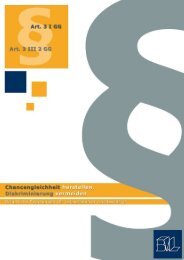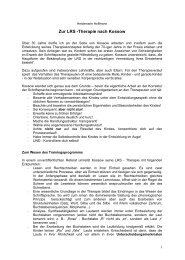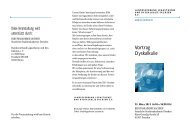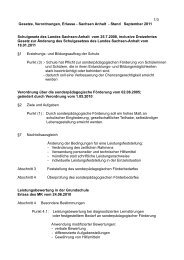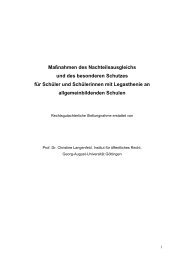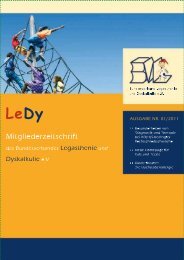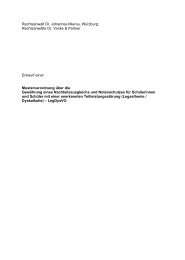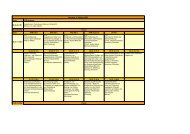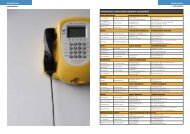Testverfah - Bundesverband Legasthenie und Dyskalkulie eV
Testverfah - Bundesverband Legasthenie und Dyskalkulie eV
Testverfah - Bundesverband Legasthenie und Dyskalkulie eV
Erfolgreiche ePaper selbst erstellen
Machen Sie aus Ihren PDF Publikationen ein blätterbares Flipbook mit unserer einzigartigen Google optimierten e-Paper Software.
15. Kongress des <strong>B<strong>und</strong>esverband</strong>es <strong>Legasthenie</strong> Abstractband<br />
Functional brain correlates of phonological processing<br />
Bernhard Blanz (1), *Carolin Ligges<br />
University Clinic Jena, Department of Child and Adolescent Psychiatry, Jena, Deutschland<br />
Although the debate about the etiological mechanism in dyslexia is still going on,<br />
empirical evidence strongly supports the phonological deficit hypothesis, describing<br />
the fact that difficulties in phonological processing are supposed to be the major<br />
cause for developmental dyslexia.<br />
Firstly an overview about neuroimaging and electrophysiological findings of <strong>und</strong>isturbed<br />
phonological language processing will be given, followed by recent international<br />
empirical evidence (fMRI- and EEG-data) supporting the phonological deficit<br />
hypothesis.<br />
In the last ten years, a multitude of international neuroimaging studies demonstrated<br />
that even across different language systems (shallow vs. deep orthographies) the<br />
phonological processing deficit can be associated with an <strong>und</strong>er activation in posterior<br />
temporal language areas, accompanied most of the time by an over activation<br />
in frontal language areas. This over activation meanwhile has consistently been<br />
interpreted to reflect a compensational process for the weak phonological processing<br />
capacities.<br />
Although there are less electrophysiological studies investigating the phonological<br />
processing deficit with event-related potentials in EEG, evidence for a phonological<br />
deficit seems to be reflected in a diminished negativity in the range of 400-600 ms,<br />
when phonologically demanding tasks have to be processed.<br />
In the second part of the talk, own empirical findings examining phonological processing<br />
deficits in dyslexia with functional MRI as well as EEG will be described and<br />
discussed.<br />
This study has been supported by the Interdisziplinäres Zentrum für klinische Forschung<br />
(IZKF), Grant B307-04004.<br />
Korrespondenzautor:<br />
Carolin Ligges<br />
Carolin.Ligges@med.uni-jena.de<br />
++49 03641 935536<br />
++49 03641 935536<br />
Überprüfung verschiedener Ursachenmodelle bei der Lese-Rechtschreibstörung<br />
mittels fMRT <strong>und</strong> EEG – ein Werkstattbericht<br />
*Carolin Ligges (1), Tanja Jungmann (1), Marc Ligges (1), Ralph Houker (2), Bernhard<br />
Blanz (1), Marc Ligges (1)<br />
(1) Klinik für Kinder- <strong>und</strong> Jugendpsychiatrie, Universitätsklinikum Jena, Jena, Deutschland; (2) Biomagnetisches<br />
Zentrum, Universitätsklinikum Jena, Jena, Deutschland<br />
Zielsetzung:<br />
Bei der Lese-Rechtschreibstörung (LRS) handelt es sich um ein Störungsbild, in<br />
dessen Rahmen unterschiedliche Ursachenmodelle diskutiert werden, die jeweils<br />
53



